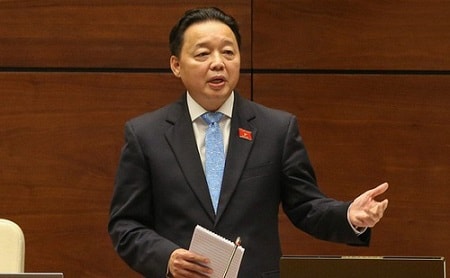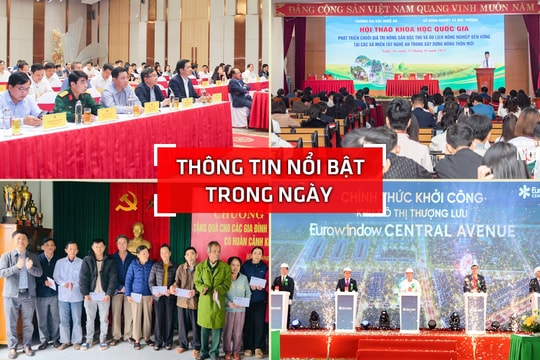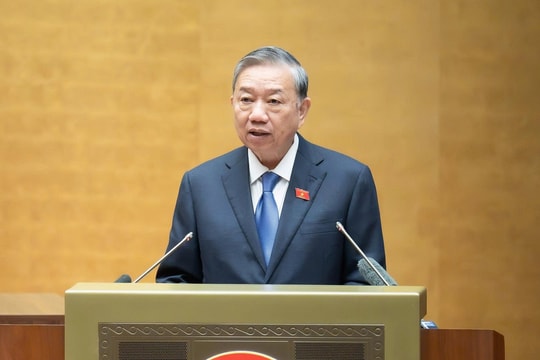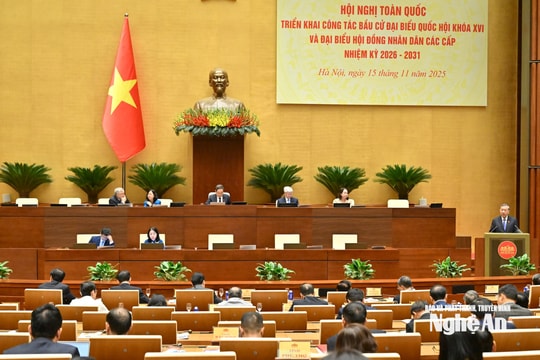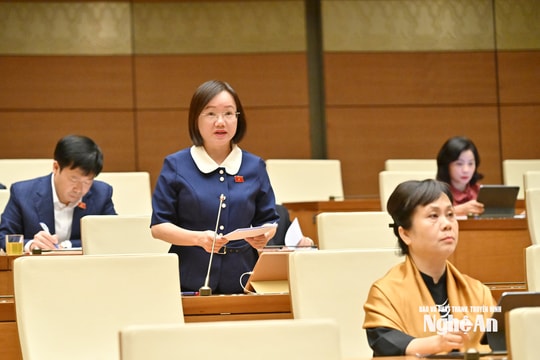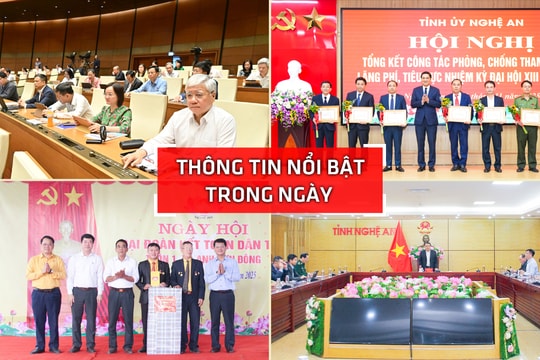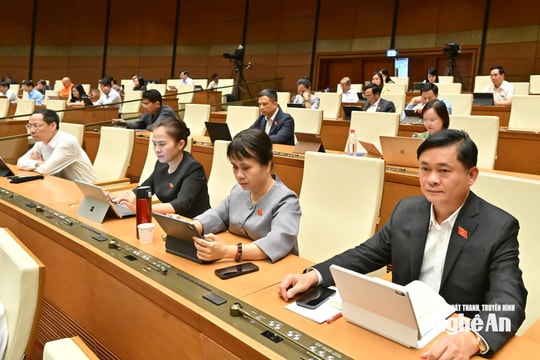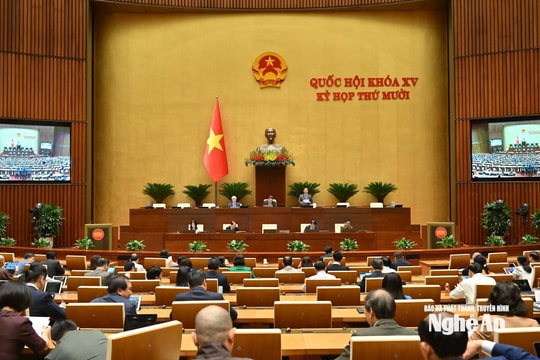The Government submits the Draft Law on Environmental Protection (amended)
Continuing the program of the 9th session of the 14th National Assembly, on the morning of May 26, Minister of Natural Resources and Environment Tran Hong Ha, authorized by the Prime Minister, presented a report on the Draft Law on Environmental Protection (amended).
|
| Minister of Natural Resources and Environment Tran Hong Ha. Photo: SGGP |
Presenting the Report on the Draft Law on Environmental Protection (amended), Minister of Natural Resources and Environment Tran Hong Ha said: The Law on Environmental Protection (LEP) 2014 has introduced many innovative policies and approaches, gradually changing the management and resolution of environmental issues from passive response to proactive prevention and control of projects that pose a risk of causing environmental pollution to contribute to sustainable economic growth. However, new issues and challenges arising from real life, which have been of interest to the parliament and National Assembly deputies, have been discussed and reflected upon, raising the urgent need to amend the Law on Environmental Protection.
Specifically, the current Law on Environmental Protection has not been able to keep up with the rapid changes in practice. The management method is still heavily administrative, mainly based on processes and procedures, and has not focused on management according to environmental protection goals and results. Some new regulations are only at the framework level, not detailed, so they do not ensure enforcement. Many contents on environmental protection are still scattered in different laws.
Our country's environment is becoming increasingly complex. Environmental quality in some places has exceeded the allowable threshold, no longer able to receive waste. Major environmental incidents, disease outbreaks, especially the Covid-19 pandemic, are sounding the alarm, requiring rapid changes in environmental management and control methods.
Many viewpoints, guidelines and policies of the Party and State on sustainable development, environmental protection and new international commitments related to the environment (CPTPP, EVFTA...) need to be institutionalized soon. The achievements of the 4th industrial revolution require innovation in thinking and methods in environmental management.
 |
| 9th session, 14th National Assembly. Photo: Quochoi.vn |
Therefore, it is time to form a comprehensive, comprehensive, synchronous and unified law on environmental protection, ensuring effectiveness and efficiency.
Minister Tran Hong Ha said that during the process of drafting the Law, the drafting agency had summarized and evaluated the implementation of the 2014 Law on Environmental Protection; reviewed new policies and guidelines of the Party and State, commitments and relevant international treaties; studied the management experience of more than 10 countries, especially, deeply studied the experience of Korea because it has many similarities with Vietnam.
At the same time, the drafting agency has organized to widely collect opinions from people, businesses, and organizations working directly with a number of ministries to unify the content of the draft Law with other laws.
The objective of the Law Project is to promptly institutionalize the Party's guidelines and policies, the State's policies, especially Conclusion No. 56-KL/TW dated August 23, 2019 of the Politburo. Vietnam's environmental institutional reform is in harmony with the world's environmental protection laws and policies, meeting the requirements of international integration. The ultimate goal is to improve environmental quality, protect people's health, balance ecology, conserve biodiversity and develop a sustainable economy.
Regarding the guiding viewpoint for the development of the Law Project, Minister Tran Hong Ha emphasized that environmental protection must be placed at the center of development decisions. The environment is not only a living space for humans but also a condition, foundation, and prerequisite for sustainable socio-economic development. We do not trade the environment for economic growth. We conduct screening and selection of development investments based on environmental criteria. Ensure harmony of interests, create incentives for relevant parties to participate in environmental protection work.
Environmental protection must take protecting people's health as the top priority, ensuring that all people have the right to live in a clean environment; based on prevention, combined with overcoming pollution, degradation and improving environmental quality;
As a basic law on environmental protection, the Law on Environmental Protection must ensure comprehensiveness, synchronization, unity, overcome dispersion, create a solid legal foundation for shaping the transformation of economic models towards sustainability; create a legal basis for implementing international commitments and responsibilities stipulated in new generation free trade agreements.
Minister Tran Hong Ha said that after the process of reviewing, absorbing and perfecting according to the direction of the National Assembly Standing Committee and the review opinions of the National Assembly's Committee on Science, Technology and Environment, the draft Law has been absorbed and perfected, including 16 chapters and 186 articles.
The Draft Law has many fundamental innovations such as cutting over 40% of administrative procedures, reducing the time to carry out administrative procedures from 20 to 75 days. Contributing to reducing compliance costs for businesses through regulations: Narrowing down about 20% of subjects required to conduct environmental impact assessments; integrating administrative procedures into environmental licenses; not maintaining a periodic environmental monitoring regime for businesses that comply well with environmental protection laws.
The report on the review of the draft Law on Environmental Protection (amended) presented by Chairman of the National Assembly's Committee on Science, Technology and Environment Phan Xuan Dung said that amending the 2014 Law on Environmental Protection is necessary.
The Committee on Science, Technology and Environment found that the draft Law has comprehensively revised and supplemented regulations on the rights, obligations and responsibilities of agencies, organizations, households and individuals in environmental protection activities; State management responsibilities for environmental protection... in the direction of strongly innovating mechanisms, measures and management tools in environmental protection activities to be consistent with international practices and practices, improving the effectiveness of state management of environmental protection.
With the proposed amendments, supplements and scope of adjustment as stated in the Government's Submission, the conversion into the draft Law on Environmental Protection (amended) is appropriate.
Although there are still some issues that need to be further studied, clarified and perfected, especially regarding consistency with the legal system and feasibility of policies, the Committee for Science, Technology and Environment finds that the Draft Law on Environmental Protection (amended) submitted by the Government to the National Assembly has been carefully prepared, complete and in accordance with the provisions of the Law on Promulgation of Legal Documents, and is qualified to be submitted to the National Assembly for consideration and comments./.

